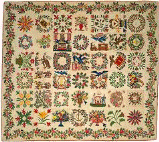Textile Society of America

Textile Society of America: Symposium Proceedings
Date of this Version
2006
Document Type
Article
Citation
Textile Narratives & Conversions: Proceedings of the 10th Biennial Symposium of the Textile Society of America, October 11–14, Toronto, Ontario
Abstract
Idealized nature entered the homes of middle and upper class Americans in the mid nineteenth century in opposition to the harsh realities of growing industrialization, and as a celebration of humanity’s control over nature as both a recreation and commodity. This “man made nature” is evident in other ways during the same period: domestic architecture, with its bay windows extending into a cultured garden and yard; the growing popularity of pet keeping; and the science-mania that caused men and women alike to crowd into theaters to hear natural scientists espouse theories of glaciation or coral reef growth. This large-scale cultural interest in nature found its way into ladies’ employment through fancywork and crafts.
Fancywork, in general, has already been found to be an outlet for creativity, not mere rote repetition of a pattern. It has been shown to be a physical symbol of relationships, of morality, and of education in the home. I will be focusing on a subset of these crafts, what I call “nature fancywork.” This paper represents part of my doctoral work at the University of Wisconsin – Madison. I have studied over 150 such objects and over 300 references to them in the popular women’s periodicals spanning from 1850 to 1914. Many of these nature fancywork objects were decorated with or made entirely of shells, feathers, whole birds or bird parts, fur (including amateur taxidermy), ferns, moss, seaweed, nuts, pine cones, and so on. These are all natural materials, which, for the most part, required the maker to collect the objects in the wild, or as near to the wild as she could get. They also required the maker to study these objects with both an artistic and scientific eye. The qualities required of the maker result in objects that reflect cultural values concerning the natural world.


Comments
Copyright 2006 by the author.